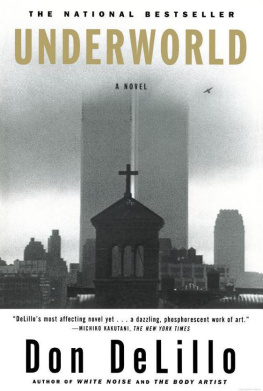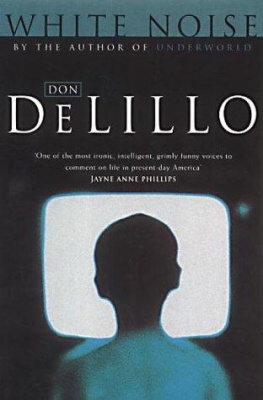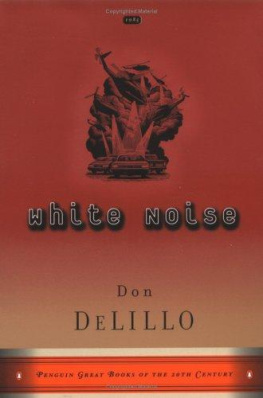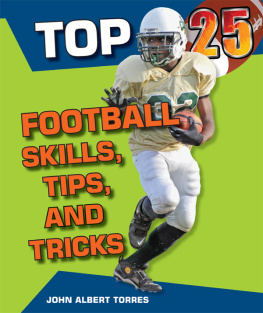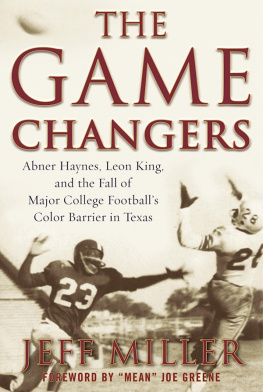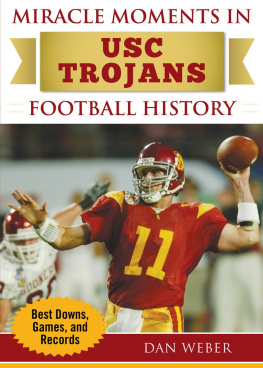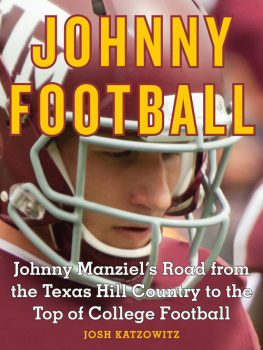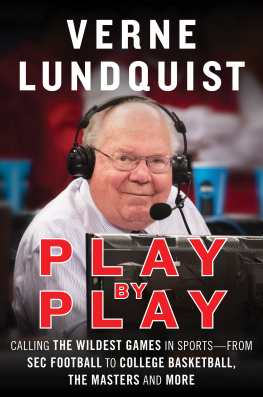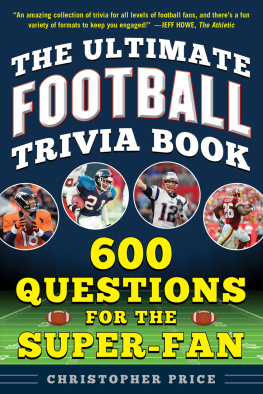Don DeLillo - End Zone
Here you can read online Don DeLillo - End Zone full text of the book (entire story) in english for free. Download pdf and epub, get meaning, cover and reviews about this ebook. year: 1986, publisher: Penguin (Non-Classics), genre: Detective and thriller. Description of the work, (preface) as well as reviews are available. Best literature library LitArk.com created for fans of good reading and offers a wide selection of genres:
Romance novel
Science fiction
Adventure
Detective
Science
History
Home and family
Prose
Art
Politics
Computer
Non-fiction
Religion
Business
Children
Humor
Choose a favorite category and find really read worthwhile books. Enjoy immersion in the world of imagination, feel the emotions of the characters or learn something new for yourself, make an fascinating discovery.

- Book:End Zone
- Author:
- Publisher:Penguin (Non-Classics)
- Genre:
- Year:1986
- Rating:5 / 5
- Favourites:Add to favourites
- Your mark:
- 100
- 1
- 2
- 3
- 4
- 5
End Zone: summary, description and annotation
We offer to read an annotation, description, summary or preface (depends on what the author of the book "End Zone" wrote himself). If you haven't found the necessary information about the book — write in the comments, we will try to find it.
End Zone — read online for free the complete book (whole text) full work
Below is the text of the book, divided by pages. System saving the place of the last page read, allows you to conveniently read the book "End Zone" online for free, without having to search again every time where you left off. Put a bookmark, and you can go to the page where you finished reading at any time.
Font size:
Interval:
Bookmark:

Don DeLillo
End Zone
taft robinson was the first black student to be enrolled at Logos College in west Texas. They got him for his speed.
By the end of that first season he was easily one of the best running backs in the history of the Southwest. In time he might have turned up on television screens across the land, endorsing eightthousanddollar automobiles or avocadoflavored instant shave. His name on a chain of fastfood outlets. His life story on the back of cereal boxes. A drowsy monograph might be written on just that subject, the modern athlete as commercial myth, with footnotes. But this doesn't happen to be it. There were other intonations to that year, for me at least, the phenomenon of antiapplausewords broken into brute sound, a consequent silence of metallic texture. And so Taft Robinson, rightly or wrongly, no more than haunts this book. I think it's fitting in a way. The mansion has long been haunted (double metaphor coming up) by the invisible man.
But let's keep things simple. Football players are simple folk. Whatever complexities, whatever dark politics of the human mind, the heartthese are noted only within the chalked borders of the playing field. At times strange visions ripple across that turf; madness leaks out. But wherever else he goes, the football player travels the straightest of lines. His thoughts are wholesomely commonplace, his actions uncomplicated by history, enigma, holocaust or dream.
A passion for simplicity, for the true old things, as of boys on bicycles delivering newspapers, filled our days and nights that fierce summer. We practiced in the undulating heat with nothing to sustain us but the conviction that things here were simple. Hit and get hit: key the pulling guard; run over people; suck some ice and reassume the threepoint stance. We were a lean and dedicated squad run by a hungry coach and his seven oppressive assistants. Some of us were more simple than others; a few might be called outcasts or exiles; three or four, as on every football team, were crazy. But we were all even myselfwe were all dedicated.
We did grass drills at a hundred and six in the sun. We attacked the blocking sleds and strutted through the intersecting ropes. We stood in what was called the chute (a narrow strip of ground bordered on two sides by blocking dummies) and we went one on one, blocker and passrusher, and handfought each other to the earth. We butted, clawed and kicked. There were any number of fistfights. There was one sprawling freeforall, which the coaches allowed to continue for about five minutes, standing on the sidelines looking pleasantly bored as we kicked each other in the shins and threw dumb rights and lefts at caged faces, the more impulsive taking off their helmets and swinging them at anything that moved. In the evenings we prayed.
I was one of the exiles. There were many tunes, believe it, when I wondered what I was doing in that remote and unfed place, that summer tundra, being hit high and low by a foaming pair of 240pound Texans. Being so tired and sore at night that I could not raise an arm to brush my teeth. Being made to obey the savage commands of unreasonable men. Being set apart from all styles of civilization as I had known or studied them. Being led in prayer every evening, with the rest of the squad, by our coach, warlock and avenging patriarch. Being made to lead a simple life.
Then they told us that Taft Robinson was coming to school. I looked forward to his arrivalan event, finally, in a time of incidents and small despairs. But my teammates seemed sullen at the news. It was a break with simplicity, the haunted corner of a dream, some piece of forest magic to scare them in the night.
Taft was a transfer student from Columbia. The word on him was good all the way. (1) He ran the hundred in 9.3 seconds. (2) He had good moves and good hands. (3) He was strong and rarely fumbled. (4) He broke tackles like a man pushing through a turnstile. (5) He could passblockwhen in the mood.
But mostly he could flya 9.3 clocking for the hundred. Speed. He had sprinter's speed. Speed is the last excitement left, the one thing we haven't used up, still naked in its potential, the mysterious black gift that thrills the millions.
(EXILE or outcast: distinctions tend to vanish when the temperature exceeds one hundred.)
Taft Robinson showed up at the beginning of September, about two weeks before regular classes were to start. The squad, originally one hundred bodies, soon down to sixty, soon less, had reported in the middle of August. Taft had missed spring practice and twenty days of the current session. I didn't think he'd be able to catch up. I was in the president's office the day he arrived. The president was Mrs. Tom Wade, the founder's widow. Everybody called her Mrs. Tom. She was the only woman I had ever seen who might accurately be described as Lincolnesque. Beyond appearance I had no firm idea of her reality; she was tall, blackbrowed, stark as a railroad spike.
I was there because I was a northerner. Apparently they thought my presence would help make Taft feel at home, an idea I tended to regard as laughable. (He was from Brooklyn, having gone on to Columbia from Boys High, a school known for the athletes it turns out.) Mrs. Tom and I sat waiting.
"My husband loved this place," she said. "He built it out of nothing. He had an idea and he followed it through to the end. He believed in reason. He was a man of reason. He cherished the very word. Unfortunately he was mute."
"I didn't know that."
"All he could do was grunt. He made disgusting sounds. Spit used to collect at both corners of his mouth. It wasn't a real pretty sight."
Taft walked in flanked by our head coach, Emmett Creed, and backfield coach, Oscar Veech. Right away I estimated height and weight, about sixtwo, about 210. Good shoulders, narrow waist, acceptable neck. Prize beef at the county fair. He wore a dark gray suit that may have been as old as he was.
Mrs. Tom made her speech.
"Young man, I have always admired the endurance of your people. You've a tough row to hoe. Frankly I was against this from the start. When they told me their plan, I said it was bushwah. Complete bushwah. But Emmett Creed is a mighty persuasive man. This won't be easy for any of us. But what's reason for if not to get us through the hard times? There now. I've had my say. Now you go on ahead with Coach Creed and when you're all thoo talking football you be sure to come on back here and see Mrs. Berry Trout next door. She'll get you all settled on courses and accommodations and things. History will be our ultimate judge."
Then it was my turn.
"Gary Harkness," I said. "We're more or less neighbors. I'm from upstate New York."
"How far up?" he said.
"Pretty far. Very far in fact. Small town in the Adirondacks."
We went over to the players' dorm, an isolated unit just about completed but with no landscaping out front and wet paint signs everywhere. I left the three of them in Taft's room and went downstairs to get suited up for afternoon practice. Moody Kimbrough, our right tackle and captain on offense, stopped me as I was going through the isometrics area.
"Is he here?"
"He is here," I said.
"That's nice. That's real nice."
In the training room Jerry Fallon had his leg in the whirlpool. He was doing a crossword puzzle in the local newspaper.
"Is he here?"
"He is everywhere," I said.
"Who?"
"Supreme being of heaven and earth. Three letters."
"You know who I mean."
Next pageFont size:
Interval:
Bookmark:
Similar books «End Zone»
Look at similar books to End Zone. We have selected literature similar in name and meaning in the hope of providing readers with more options to find new, interesting, not yet read works.
Discussion, reviews of the book End Zone and just readers' own opinions. Leave your comments, write what you think about the work, its meaning or the main characters. Specify what exactly you liked and what you didn't like, and why you think so.

